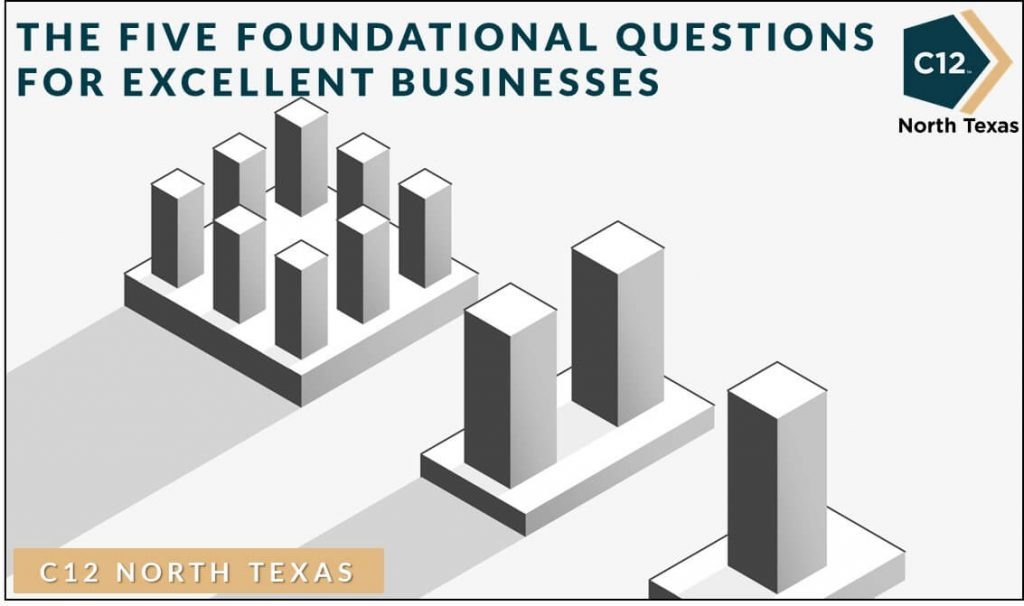Our Promise to
Every Member
We promise to be an example of all we promote, to be accountable to our members and to seek their correction when any deviations appear. We serve as a resource for education, encouragement, challenge, inspiration and accountability.
The Five Foundational Questions for Excellent Businesses

Business leaders often consider what makes outstanding companies so great. There are many factors, of course, including serving the right markets with the right products or services. Beyond such specifics, are there foundational reasons why some companies are excellent (and, by implication, most companies are not)? I would suggest that strong foundations, fundamentals if you will, are essential. Answering five important questions with clarity, communicating the answers consistently, and reinforcing them relentlessly establish an enduring and effective foundation. Here are the questions.
1. Why do we do it?
In my experience with dozens of Christian business owners, this is the hardest question. The temptation is to avoid the question altogether or answer with an obvious “to make a living” statement. Simon Sinek in his book, “Start With Why”, argues persuasively that the “why” matters much more than what we do or how we do it. A good “why do we do it” answer connects with a passion that transcends the immediate issues of the business. It identifies what drives the business and rarely is associated with a product or service. When owners speak of “making a difference” or “changing the world (or their community)” or something of that ilk, they are nearing their “why.”
2. What do we value most?
As compared to the first question, this one actually is much easier to answer but seldom is applied effectively. The value I speak of concerns the attributes of employees of the company. In an age where we promote diversity, it may seem counter-intuitive to define and then insist on common values. Yet, for a small number of essential characteristics, consider the impact of divergent values. In a customer service business, how can rudeness be allowed? In a financial company, how can dishonesty be tolerated? Strong companies define their values precisely and use them in hiring, firing, and promotion. Their values are the bedrock for all important decisions and enable great clarity within the company.
3. What do we do?
Finally, we get to what seems like a simple question. However, almost all companies get this one wrong because they are internally focused. The simple answers are a list of current products or services. The better answers are what those products and services produce in customers. This is an external view that focuses on the benefits delivered by the company. A company that does financial planning might actually deliver security or confidence. A business that serves chicken may actually attract customers for their hospitality. A good answer here spurs innovation in a company since they can focus on many possible ways to deliver the fundamental value and not just on the current offerings.
4. Where are we going?
It is hard to run a successful business and most owners and management teams feel compelled to work the operational or tactical details almost exclusively. The fear is that without that kind of attention, the business will suffer. Clearly, there needs to be much attention paid to the details. But, and this is important, day-to-day thinking rarely defines a compelling direction for the company. Bill Hybels says that a vision is a “description of the future that excites passion in people.” Stated another way, it is what a company hopes to become in 3-5 years. A clear vision explicitly explains what has to change between now and then. Thus, it provides a decision framework for all major changes that need to happen. It is a destination that unifies a company.
5. What will we become?
Aspirations are inspirations. Parents often think about this question as their children grow up. The sense that the children will be different from today is powerful because it recognizes that change is inevitable and that preparation for that change can be guided. Companies, too, are inevitably changing. However, mostly this happens in an unguided way. The best companies, you won’t be surprised, don’t leave this to chance. Instead, they create descriptions of the future that challenge themselves to grow in specific ways. The challenges recognize the current state of the company while building the case that it is unacceptable to stay there. Great companies have an urgency to improve.
These questions apply, I believe, to all companies, large and small. It behooves an owner or CEO to think about their answers and use them within their company to create a strong foundation. (At C12, we regularly help Christian CEOs and Business Owners have good answers to these questions through our executive roundtables.)

Tom Hawes is the Principal Chair for C12 North Texas. Since 2011, Tom has had the pleasure of facilitating forums in North Texas. Contact him at [email protected] or 214-620-9366.
Recent Blog
Archives
2020
-
September (1)
-
August (3)
-
July (1)
-
March (4)

